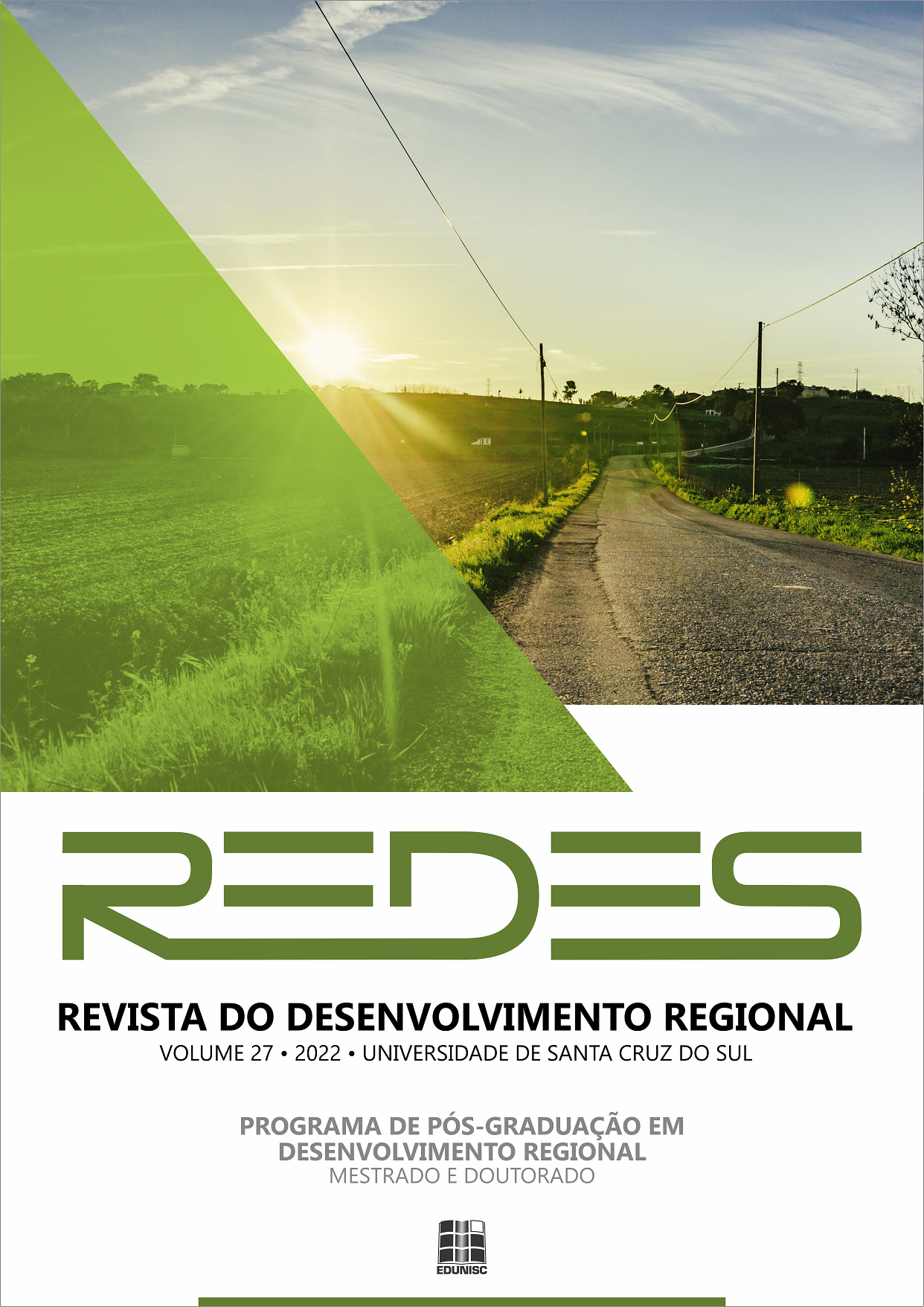Por Que Dizem “Adiós”: Uma Compreensão Crítica Da Economia Política Da Migração Contemporânea De Venezuelanos
DOI:
https://doi.org/10.17058/redes.v27i1.17469Palavras-chave:
Venezuela, Migração, Economia política, Teoria push and pull, Crise econômicaResumo
O objetivo deste estudo é criar um padrão olhando para o contexto histórico do movimento migratório na Venezuela e revelar que a diáspora venezuelana é um movimento social que ocorre com fatores push, com base na teoria push and pull. Nesse contexto, concentrou-se no contexto econômico e político do movimento migratório venezuelano e, analisando a história da economia política, determinou-se que o movimento migratório ocorreu em três ondas diferentes. Ao analisar os fatores de impulso, acompanhou-se o desenvolvimento do fenômeno migratório na Venezuela e traçou-se um quadro com os contextos sociológicos dos países-alvo. O principal argumento do artigo é a afirmação de que o atual movimento migratório venezuelano ocorreu com fatores de impulso, considerando as condições econômicas e políticas, enquanto as duas primeiras ondas migratórias foram dependentes dos fatores de atração.
Downloads
Referências
AKGEMCİ, E. MONROE Doktrini'nin İzinde: Latin Amerika'da ABD Müdahaleciliğinin Tarihsel Gelişimi. E. Akgemci, & K. Ateş, in Dünyanın Ters Köşesi (s. 53-74). İletişim Yayınları, 2020.
ALJAZEERA. Venezuela government denies facing migration crisis. 2020. Retrieved from https://www.aljazeera.com/news/2018/9/4/venezuela-government-denies-facing-migration-crisis
ALVARADO, S. E., & MASSEY, D. S. Continental Divides: International Migration in the Americas In Search of Peace: Structural Adjustment, Violence, and International Migration. Annals of the American Academy of Political and Social Science, Vol.630, 137-161, 2010.
BURGGRAAFF, W. J. The Venezuelan Armed Forces in politics, 1935-1959. University of Missouri Press, 1972.
CONNOLLY, A. Venezuela closing consulates in Vancouver, Toronto, Montreal amid diplomatic tensions. Global News, June 9, 2019. Retrieved from https://globalnews.ca/news/5371022/venezuela-closing-consulates-embassy-still-open/
FREİER, L. F., & PARENT, N. The Regional Response to the Venezuelan Exodus. Current History, 118 (805), 56-61, 2019.
GÜDER, S. A Comparative Analysis of the Foreign Policy Perspectives in two Latin American States: Brazil and Venezuela in the Twenty-First Century. Unpublished MA thesis, 2011.
GÜDER, S. Venezuela'da Maduro yeniden başkan, ABD tepkili. Anadolu Agency, 2018. Retrieved from https://www.aa.com.tr/tr/analiz-haber/venezuelada-maduro-yeniden-baskan-abd-tepkili/1153552
HELLINGER, D. Chávez and the Intellectuals. NACLA Report on the Americas, 45(4), 51-52.
HUANG, C., & GOUGH, K. The Venezuelan Migrant Crisis: Forging a Model for Regional Response. Center for Global Development, 2018. Retrieved from https://www.cgdev.org/publication/venezuelan-migrant-crisis-forging-model-regional-response
ISBELL, P. The New Energy Scenario and its Geopolitical Implications. Real Instituto Elcano, 2007.
JACOME, F. Petrocaribe: The Current Phase of Venezuela’s Oil Diplomacy in the Caribbean. Friedrich Ebert Stiftung Programa de Cooperación en Seguridad Regional, 2011.
KAYA, E. Hugo Chavez’in Petrol Politikası ve ABD. SDU Faculty of Arts and Sciences Journal of Social Sciences, Vol.31, 193-208, 2014.
KORNBLITH, M. Chavismo after Chávez? Journal of Democracy 24 (3), 47-61, 2014.
KÖSE, M. Türk Diasporasının Siyasal Katılımı Çerçevesinde Diaspora Politikalarının Gelişimi, (The development of diaspora policies through politicalparticipation of Turkish diaspora). Unpublished PhD thesis, 2020.
LUDLAM, S., & LIEVESLEY, G. Latin Amerika'da Radikal Sosyal Demokrasi Deneyimleri. Phoenix, 2012.
MORRISON, D. Hugo Chavez: The man who raised oil prices. Labour & Trade Union Review, 2000.
MUGGAH, R., & TOBÓN, K. A. Citizen Security in Latin America. Facts and Figures. Igarapé Institute, Strategic Paper, N. 33, 2018.
ÖBERG, S. Spatial and Economic Factors in Future South-North Migration. In: LUTZ İÇİNDE. W. The future population of the world : what can we assume today? (s. 336-358). Earthscan, 1996.
ÖZER, S. Latin Amerika'da Zorunlu Göç. C. U. Oğuz, S. Atvur, & R. İzol, in 21. Yüzyılda Latin Amerika (s. 273-292). Seçkin Yayıncılık, 2019.
REGİONAL REFUGEE INSTRUMENTS & RELATED. San José Declaration on Refugees and Displaced Persons, 1994. Retrieved from https://www.refworld.org/docid/4a54bc3fd.html
REGİONAL REFUGEE INSTRUMENTS & RELATED. Brazil Declaration and Plan of Action, 2014. Retrieved from https://www.refworld.org/docid/5487065b4.html
RESPONSE FOR VENEZUELANS. Coordination Platform for Refugees and Migrants from Venezuela, 2020.
RESPONSE FOR VENEZUELANS. Refugee and Migrant Response Plan. 2020.
Sullivan, M. P. Venezuela: Political Conditions and U.S. Policy. Congressional Research Service, 2009.
SYLVIA, R. D., & DANOPOULOS, C. The Chávez Phenomenon: Political Change in Venezuela. Third World Quarterly, Vol.24 No.1, 63-76, 2003.
TARVER, H., & FREDERICK, J. The History of Venezuela. New York: St. Martin's Press Griffin, 2006.
TONELLA-TÜZÜN, L. M. Latin Amerika ve Karayip Ülkelerinde Venezuelalı Mülteci Krizinin Yönetimi ve Covid-19 Pandemisi. In İ. Ermağan, E. Tahsin, & S. Tekin, Dünya Siyasetinde Latin Amerika, 3 (s. 475-498). Nobel Yayıncılık, 2021.
TOPAL, A. Latin Amerikayı Anlamak – Neoliberalizm, Direniş ve Sol. İstanbul: Yordam Yayınevi, 2007.
UNHCR. Convention and Protocol Relating to the Status of Refugees, 1951. UNHCR: https://www.unhcr.org/3b66c2aa10 adresinden alındı
UNHCR. Cartagena Declaration on Refugees. UNHCR. 1984. Retrieved from https://www.unhcr.org/about-us/background/45dc19084/cartagena-declaration-refugees-adopted-colloquium-international-protection.html
UNİTED NATİONS HİGH COMMİSSİONER FOR REFUGEES. The Guidance Note on the Outflow of Venezuelans. UNHCR. 2018.
Downloads
Publicado
Como Citar
Edição
Seção
Licença
A submissão de originais para este periódico implica na transferência, pelos autores, dos direitos de publicação impressa e digital. Os direitos autorais para os artigos publicados são do autor, com direitos do periódico sobre a primeira publicação. Os autores somente poderão utilizar os mesmos resultados em outras publicações indicando claramente este periódico como o meio da publicação original. Em virtude de sermos um periódico de acesso aberto, permite-se o uso gratuito dos artigos em aplicações educacionais e científicas desde que citada a fonte conforme a licença CC-BY da Creative Commons. Creative Commons Atribuição 4.0 Internacional.
Creative Commons Atribuição 4.0 Internacional.



